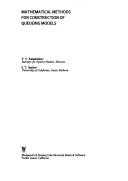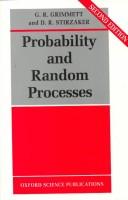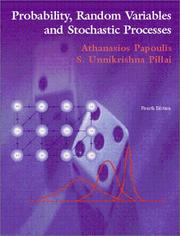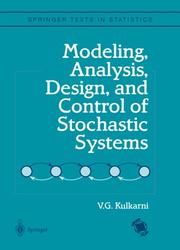| Listing 1 - 10 of 32 | << page >> |
Sort by
|
Book
Abstract | Keywords | Export | Availability | Bookmark
 Loading...
Loading...Choose an application
- Reference Manager
- EndNote
- RefWorks (Direct export to RefWorks)
Modeling --- Markov Chain --- Probability --- Stochastic Process --- Queueing Theory --- Queuing theory

ISBN: 0534132545 Year: 1990 Publisher: Pacific Grove, Calif. : Wadsworth & Brooks/Cole,
Abstract | Keywords | Export | Availability | Bookmark
 Loading...
Loading...Choose an application
- Reference Manager
- EndNote
- RefWorks (Direct export to RefWorks)
Queuing theory --- Stochastic process --- Files d'attente, Théorie des --- Mathematical models
Book
ISBN: 1283857952 3110278987 9783110278989 3110278898 9783110278897 9783110278897 Year: 2012 Publisher: Berlin Boston
Abstract | Keywords | Export | Availability | Bookmark
 Loading...
Loading...Choose an application
- Reference Manager
- EndNote
- RefWorks (Direct export to RefWorks)
Brownian motion is one of the most important stochastic processes in continuous time and with continuous state space. Within the realm of stochastic processes, Brownian motion is at the intersection of Gaussian processes, martingales, Markov processes, diffusions and random fractals, and it has influenced the study of these topics. Its central position within mathematics is matched by numerous applications in science, engineering and mathematical finance. Often textbooks on probability theory cover, if at all, Brownian motion only briefly. On the other hand, there is a considerable gap to more specialized texts on Brownian motion which is not so easy to overcome for the novice. The authors' aim was to write a book which can be used as an introduction to Brownian motion and stochastic calculus, and as a first course in continuous-time and continuous-state Markov processes. They also wanted to have a text which would be both a readily accessible mathematical back-up for contemporary applications (such as mathematical finance) and a foundation to get easy access to advanced monographs. This textbook, tailored to the needs of graduate and advanced undergraduate students, covers Brownian motion, starting from its elementary properties, certain distributional aspects, path properties, and leading to stochastic calculus based on Brownian motion. It also includes numerical recipes for the simulation of Brownian motion.
Brownian motion processes. --- Stochastic processes. --- Random processes --- Probabilities --- Wiener processes --- Brownian movements --- Fluctuations (Physics) --- Markov processes --- Brownian Motion. --- Numerical Simulation. --- Stochastic Calculus. --- Stochastic Process.
Book
ISBN: 0198534485 9780198534488 Year: 1991 Publisher: Oxford Clarendon
Abstract | Keywords | Export | Availability | Bookmark
 Loading...
Loading...Choose an application
- Reference Manager
- EndNote
- RefWorks (Direct export to RefWorks)
Probabilities --- Stochastic processes --- Problems, exercises, etc --- Stochastic Process --- Problems, exercices,etc --- Problems, exercises, etc. --- 10.01.a --- #KVIV:BB --- #WWIS:STAT --- Random processes --- Verzekeringswiskunde ; Waarschijnlijkheidsrekening --- Probabilités --- Processus stochastiques --- Problèmes et exercices --- Probabilités. --- Probabilités --- Processus stochastiques. --- Probabilities. --- Stochastic processes. --- Probabilities - Problems, exercises, etc. --- Stochastic Process - Problems, exercices,etc --- Stochastic processes - Problems, exercises, etc. --- Probabilities - Problems, exercises, etc --- Stochastic processes - Problems, exercises, etc
Book
ISBN: 0198531850 0198531842 9780198531852 Year: 1987 Publisher: Oxford Oxford university press
Abstract | Keywords | Export | Availability | Bookmark
 Loading...
Loading...Choose an application
- Reference Manager
- EndNote
- RefWorks (Direct export to RefWorks)
519.21 --- Probabilities --- Stochastic processes --- 10.01.a --- Random processes --- Probability --- Statistical inference --- Combinations --- Mathematics --- Chance --- Least squares --- Mathematical statistics --- Risk --- 519.21 Probability theory. Stochastic processes --- Probability theory. Stochastic processes --- Verzekeringswiskunde Waarschijnlijkheidsrekening --- Verzekeringswiskunde ; Waarschijnlijkheidsrekening --- Probabilities. --- Stochastic processes. --- Stochastic Process --- Problems, exercices,etc --- Probabilities - Problems, exercises, etc. --- Stochastic Process - Problems, exercices,etc

ISBN: 0198536658 0198536666 9780198536659 Year: 1992 Publisher: Oxford Clarendon
Abstract | Keywords | Export | Availability | Bookmark
 Loading...
Loading...Choose an application
- Reference Manager
- EndNote
- RefWorks (Direct export to RefWorks)
Verzekeringswiskunde Waarschijnlijkheidsrekening --- Stochastic Process --- Problems, exercices,etc --- Probabilities --- Stochastic processes --- 10.01.a --- #KVIV:BB --- 519.21 --- 519.21 Probability theory. Stochastic processes --- Probability theory. Stochastic processes --- Random processes --- Probability --- Statistical inference --- Combinations --- Mathematics --- Chance --- Least squares --- Mathematical statistics --- Risk --- Verzekeringswiskunde ; Waarschijnlijkheidsrekening --- Probabilités --- Processus stochastiques --- Probavility --- Measure theory. --- Stochastic processes. --- Lebesgue measure --- Measurable sets --- Measure of a set --- Algebraic topology --- Integrals, Generalized --- Measure algebras --- Rings (Algebra) --- Monograph --- Probabilités. --- Probabilités --- Processus stochastiques. --- Probabilities. --- Probabilities - Problems, exercises, etc. --- Stochastic Process - Problems, exercices,etc

ISBN: 0073660116 0071122567 9780071122566 9780071226615 0071226613 9780073660110 Year: 2002 Publisher: New York McGraw-Hill
Abstract | Keywords | Export | Availability | Bookmark
 Loading...
Loading...Choose an application
- Reference Manager
- EndNote
- RefWorks (Direct export to RefWorks)
519.2 --- Probability. Mathematical statistics --- Probabilities. --- Random variables. --- Stochastic processes. --- 519.2 Probability. Mathematical statistics --- Probabilities --- Random variables --- Stochastic processes --- Random processes --- Chance variables --- Stochastic variables --- Variables (Mathematics) --- Probability --- Statistical inference --- Combinations --- Mathematics --- Chance --- Least squares --- Mathematical statistics --- Risk --- Entropy --- Spectrometry --- Stochastic process
Book
ISBN: 303656036X 3036560351 Year: 2022 Publisher: Basel MDPI - Multidisciplinary Digital Publishing Institute
Abstract | Keywords | Export | Availability | Bookmark
 Loading...
Loading...Choose an application
- Reference Manager
- EndNote
- RefWorks (Direct export to RefWorks)
Dynamic stability basically deals with the interactions between the system's components. Following a disturbance, the system's variables undergo transitions that can induce oscillations in active and reactive power generation, resulting in the occurrence of voltage oscillatory modes and frequency deviation in the system. Depending on the entity of the disturbance, the small- or large-signal stability of the system under consideration can be investigated. The introduction of RES-based generation that does not participate in the network services (i.e., frequency and voltage regulation) due to lack of special controls will undoubtedly affect both the overall frequency and voltage stability. Large-scale transient stability is also a concern not to be overlooked: inverter-based wind and solar generation have different angle/speed swing behaviors with respect to traditional generation due to reduced inertia, different voltage swing behaviors due to different voltage control systems, different power flow patterns, and different displacements of synchronous generation at key locations. Therefore, although power system stability and dynamics have played a very central role in the management and study of electrical power systems thus far, it is also true that the emerging scenario requires new methodologies, technologies, and analyses. In this light, the current Special Issue aims to collect contributions (i.e., research papers and review articles) on power system dynamics and stability from experts in academia and industry.
Technology: general issues --- History of engineering & technology --- power system stability --- inertia estimation --- PMU --- microgrids --- frequency control --- grid-forming --- 100% converter-interfaced generation --- virtual synchronous machine --- forced oscillation --- inverter-based resources (IBRs) --- grid vulnerability analysis --- active power modulation --- virtual inertia --- fast frequency measurement --- fast frequency regulation --- distributed energy resources --- ancillary services --- power hardware-in-the-loop --- legacy resources --- large perturbation angle stability --- small perturbation angle stability --- voltage stability --- synthetic inertia --- demand response --- reactive compensation --- power system restoration --- primary frequency control --- frequency nadir estimation --- low inertia systems --- real-time dynamic simulation --- national power grid --- cyber physical system (CPS) --- co-simulation --- battery energy storage system (BESS) --- energy management system (EMS) --- load modelling --- line modelling --- power system analysis --- transient stability --- small-signal stability --- inverter-based resources --- modular multilevel converters --- primary frequency regulation --- battery energy storage system --- Ornstein–Uhlenbeck stochastic process --- compound poisson stochastic process --- frequency stability --- rotor angle stability --- power system inertia --- converter-interfaced generation --- renewable power generators

ISBN: 0387987258 1441931546 1475730985 Year: 1999 Publisher: New York, N.Y. Springer
Abstract | Keywords | Export | Availability | Bookmark
 Loading...
Loading...Choose an application
- Reference Manager
- EndNote
- RefWorks (Direct export to RefWorks)
This is an introductory level text on stochastic modeling. It is suited for undergraduate or graduate students in actuarial science, business management, computer science, engineering, operations research, public policy, statistics, and mathematics. It employs a large number of examples to teach how to build stochastic models of physical systems, analyze these models to predict their performance, and use the analysis to design and control them. The book provides a self-contained review of the relevant topics in probability theory. The rest of the book is devoted to important classes of stochastic models. In discrete and continuous time Markov models it covers the transient and long term behavior, cost models, and first passage times. Under generalized Markov models, it covers renewal processes, cumulative processes and semi-Markov processes. All the material is illustrated with many examples. There is a separate chapter on queueing models. In the chapter on design the author shows how the techniques developed in the text can be used to optimize the performance of a system. Finally, in the last chapter, linear programming is used to compute optimal control policies for stochastic systems. The book emphasizes numerical answers to the problems. A software package called MAXIM, which runs on MATLAB, is made available for downloading. Vidyadhar G. Kulkarni is Professor of Operations Research at the University of North Craolina at Chapel Hill. He has authored a graduate level text 'Modeling and Analysis of Stochastic Systems' and research articles on stochastic models of queues, computer systems and telecommunication systems. He holds a patent on traffic management in telecommunication networks, and he has served as an editor and associate editor of Stochastic Models and Operations Research Letters.
Stochastic processes --- Stochastic processes. --- Processus stochastiques --- Applied mathematics. --- Engineering mathematics. --- Statistics . --- Probabilities. --- Operations research. --- Decision making. --- Mathematical and Computational Engineering. --- Statistics, general. --- Probability Theory and Stochastic Processes. --- Operations Research/Decision Theory. --- Deciding --- Decision (Psychology) --- Decision analysis --- Decision processes --- Making decisions --- Management --- Management decisions --- Choice (Psychology) --- Problem solving --- Operational analysis --- Operational research --- Industrial engineering --- Management science --- Research --- System theory --- Probability --- Statistical inference --- Combinations --- Mathematics --- Chance --- Least squares --- Mathematical statistics --- Risk --- Statistical analysis --- Statistical data --- Statistical methods --- Statistical science --- Econometrics --- Engineering --- Engineering analysis --- Mathematical analysis --- Decision making --- Random processes --- Probabilities --- Stochastic process
Book
ISBN: 3642021409 9786612655791 1282655795 3642021417 Year: 2009 Publisher: Berlin, Germany : Springer,
Abstract | Keywords | Export | Availability | Bookmark
 Loading...
Loading...Choose an application
- Reference Manager
- EndNote
- RefWorks (Direct export to RefWorks)
Stable Lévy processes and related stochastic processes play an important role in stochastic modelling in applied sciences, in particular in financial mathematics. This book is about the potential theory of stable stochastic processes. It also deals with related topics, such as the subordinate Brownian motions (including the relativistic process) and Feynman–Kac semigroups generated by certain Schroedinger operators. The authors focus on classes of stable and related processes that contain the Brownian motion as a special case. This is the first book devoted to the probabilistic potential theory of stable stochastic processes, and, from the analytical point of view, of the fractional Laplacian. The introduction is accessible to non-specialists and provides a general presentation of the fundamental objects of the theory. Besides recent and deep scientific results the book also provides a didactic approach to its topic, as all chapters have been tested on a wide audience, including young mathematicians at a CNRS/HARP Workshop, Angers 2006. The reader will gain insight into the modern theory of stable and related processes and their potential analysis with a theoretical motivation for the study of their fine properties.
Functional analysis. --- Potential theory (Mathematics). --- Stochastic process. --- Potential theory (Mathematics) --- Functional analysis --- Civil & Environmental Engineering --- Mathematics --- Mathematical Statistics --- Operations Research --- Engineering & Applied Sciences --- Physical Sciences & Mathematics --- Green's operators --- Green's theorem --- Potential functions (Mathematics) --- Potential, Theory of --- Functional calculus --- Mathematics. --- Mathematical models. --- Probabilities. --- Probability Theory and Stochastic Processes. --- Mathematical Modeling and Industrial Mathematics. --- Potential Theory. --- Probability --- Statistical inference --- Combinations --- Chance --- Least squares --- Mathematical statistics --- Risk --- Models, Mathematical --- Simulation methods --- Mathematical analysis --- Mechanics --- Math --- Science --- Calculus of variations --- Functional equations --- Integral equations --- Distribution (Probability theory. --- Distribution functions --- Frequency distribution --- Characteristic functions --- Probabilities --- Analyse fonctionnelle.
| Listing 1 - 10 of 32 | << page >> |
Sort by
|

 Search
Search Feedback
Feedback About UniCat
About UniCat  Help
Help News
News